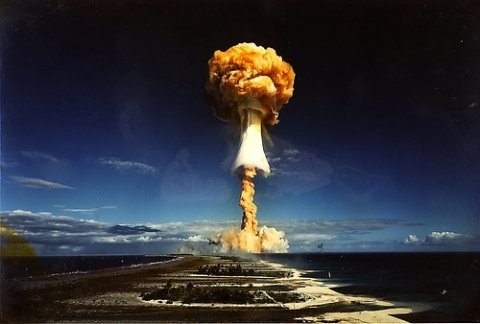Tens of thousands of people will mark the anniversary of the atomic bombing of Hiroshima on Monday, as a rising tide of anti-nuclear sentiment swells in post-Fukushima Japan.
Ageing survivors, victims’ relatives, government officials and foreign delegates will attend the annual ceremony at Hiroshima Peace Memorial Park commemorating the US bombing of the Japanese city nearly seven decades ago.
American B-29 bomber Enola Gay dropped an atomic bomb on August 6, 1945, turning the western city into a nuclear inferno and killing an estimated 140,000 in the final chapter of World War II.
At 8:15 am (2315 GMT) the toll of a temple bell will set off a moment of silence, marking the time the bomb was dropped.
Anti-nuclear rallies triggered by last year’s atomic crisis at the Fukushima Daiichi plant are expected alongside the anniversary events in Hiroshima, a long-time focal point for the global movement against nuclear weapons.
Many atomic bomb survivors oppose both military and civil use of nuclear power, pointing to the tens of thousands who were killed instantly in the Hiroshima blast and the many more who later died from radiation sickness and cancers tied to the attack.
Usually sedate Japan has seen a string of anti-nuclear protests since Prime Minister Yoshihiko Noda in June ordered the restart of two reactors.
Noda defended the move citing looming power shortages after Japan switched off its 50 nuclear reactors — which once provided the resource-poor country with a third of its energy — in the wake of the Fukushima disaster.
Weekly demonstrations outside the prime minister’s official residence have drawn thousands while a rally in west Tokyo last month saw a crowd that organisers claimed swelled to 170,000.
Noda is scheduled to attend Monday’s ceremony along with a host of foreign diplomats, including US Ambassador to Japan John Roos, who became the first official US envoy to attend the ceremony two years ago.
“The United States looks forward to continuing to work with Japan to advance President (Barack) Obama’s goal of realising a world without nuclear weapons,” the embassy said in a statement.
Among other foreign guests is Clifton Truman Daniel, 55, grandson of former US president Harry Truman, who authorised the bombing of Hiroshima and the port city of Nagasaki three days later.
He is the first Truman relative to attend the anniversary event in Japan.
The Hiroshima bombing killed an estimated 140,000 either instantly or from burns and radiation sickness soon after the blast. A second atomic bombing three days later in the city of Nagasaki killed more than 70,000.
The commemoration ceremony comes nearly a year and a half after a quake-sparked tsunami, which left some 19,000 dead or missing, knocked out cooling systems at the Fukushima plant, causing meltdowns that spread radiation over a large area and forced thousands to evacuate.
Some have moved back to nearby communities, but many more have not and there are fears it could be decades before the area was deemed safe to live in.










